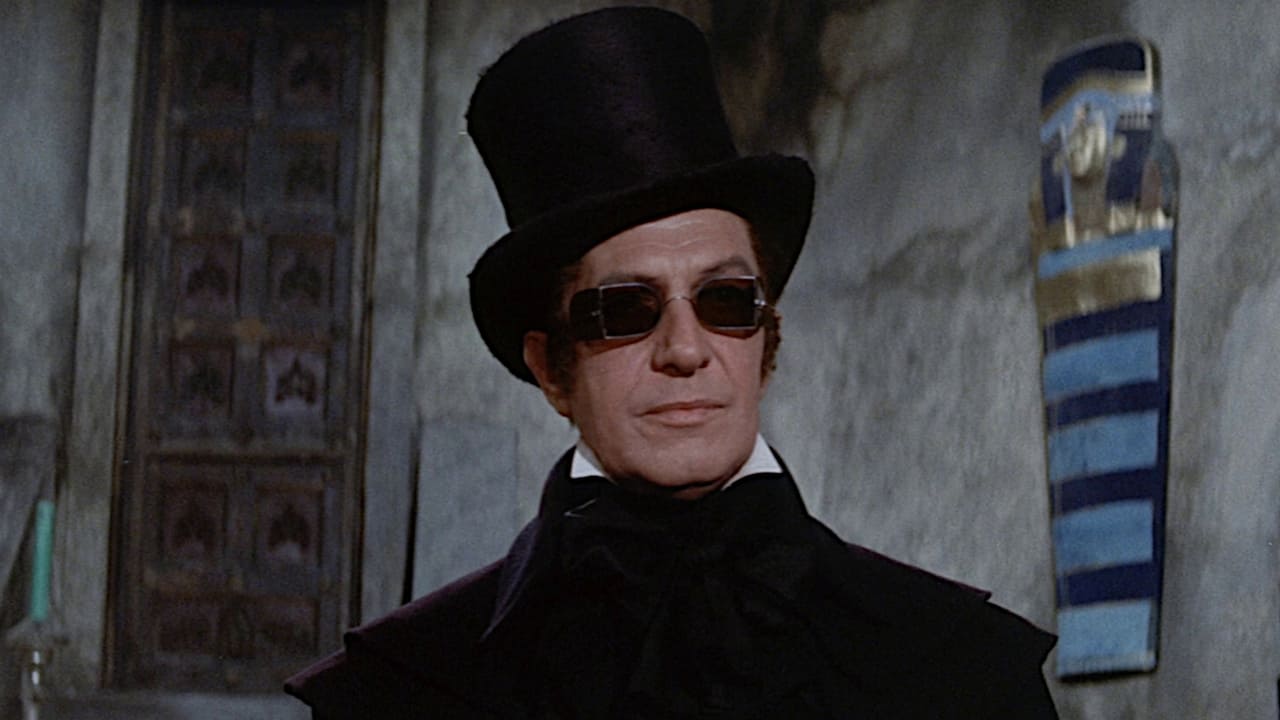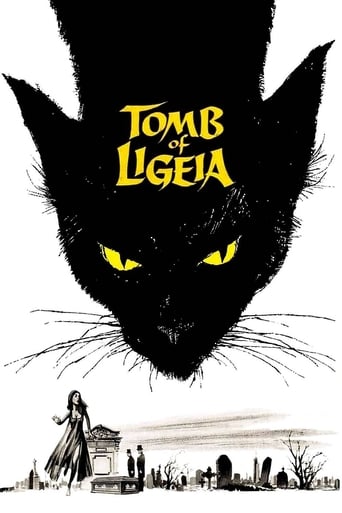

I have no interest in classic literature so I don't know much about Edgar Allan Poe.After watching this, I can confidently say he wasn't much of a writer.I remember reading The Tell Tale Heart and this story is weirdly similar.So some people are on a fox hunt and of course the only female gets separated from the group.She falls off her horse onto a grave and then screams and faints when she sees Vincent Price.One of the men hears her scream and comes to see what happened and it turns out that he knows Price and thought the property he lived on was long abandoned(even though Price has several employees and a constant stream of visitors).The woman wakes up and while Price carries her inside he tells her that he "lives at night" even though it is currently day time and he is up during the day for the rest of the movie.Less than five minutes after fainting at the site of Price, the woman wants to marry him.Ugh.There's a black cat that you will quickly realize is not just a cat.It's in the castle all the time and minutes after telling a servant to kill it, Price calls it a stray.The woman says Price is morose and he later says it too but I think they meant to say verbose because this guy will not shut up.To top it all off, the end was extremely predictable.Three stars.
... View MoreIf you want to know why Ligeia is the most Hammer-esque of Roger Corman's Poe adaptations, check cinematographer Arthur Grant's records, among them The Devil Rides Out and Frankenstein Must Be Destroyed. The splendid photography alone makes the last entry in the series a standout, along with Kenneth V. Jones's lush, pseudo-Victorian score. Enter Corman/ Poe regular Vincent Price, this time an amateur egyptologist living in a decaying abbey mourning his deceased ex and soon after falling in love with a blonde lookalike of his dead spouse – who acts out her jealousy in feline form. All-too-conscious of not being in a Poe story, but in a delirium fusion of Vertigo and Rebecca, Price plays his perv Maxim de Winter/ Norfolk Necrophiliac role with a tongue-in-cheek aplomb Laurence Olivier garnered not until eight years later in Joseph L. Mankiewicz's Sleuth, and wait until Vince gets in cat chasing mood. Though a bit convoluted, Ligeia is morbid, meow & kinky fun, actually Corman's last noteworthy movie as a director (next was his racist swastika biker dreck The Wild Angels). And the darn critter? Moved on to Mario Bava, Lucio Fulci and Dario Argento flicks. That's called Hello Kitty déjà-vu.
... View MoreVerden Fell (Vincent Price) was married to a demon woman, Ligeia, and even after death she haunts him. When he takes a new wife, Rowena, things quickly go very badly for both of them as Ligeia begins to possess Fell's new love.This was the last of Roger Corman's "Poe" series, and although considered his best by some, I found it highly lackluster. Perhaps it is because Richard Matheson was not responsible for the script? I do not know, but as good as this one was, it just fell short for me.Vincent Price is, of course, good as always. Is he ever less than the best? But the credit here should go to Elizabeth Shepherd, who played both Ligeia and Rowena. I honestly could not tell they were the same actress until the credits, and that says something for the makeup department, but also Shepherd's ability to command range of personality within a single film. She deserves to be better known.Ivan Butler shares my sense of doubt when he says the film is "a falling off from its predecessor" and "the epic sense of grandeur and doom may be missing". He goes on to praise the film, more so for its deep psychological implications and what he sees as an homage to Cocteau.Howard Thompson in the New York Times of May 6, 1965 wrote that "these low-budget shockers generally evoke a compelling sense of heady atmosphere and coiled doom in their excellent Gothic settings, arresting color schemes and camera mobility... Mr. Corman has made stunning, ambient use of his authentic setting, an ancient abbey in Norfolk, England, and the lovely countryside. The picture is not nearly as finished as Masque of the Red Death... But the Corman climate of evil is as unhealthy and contagious as ever." That sums up the film in a manner far better than I could.
... View More"Tomb of Ligeia" was the last of Corman's popular Edgar Allan Poe adaptations of the 60's. Because of how it's totally different in style from the previous entries in the series, many have deemed it as an inferior effort, though I personally think it's the total opposite. There's no doubt in my view that "Ligeia" is Corman's finest Poe adaptation. All the flaws present in his earlier films (even in the more well praised "Masque of the Red Death"), that have become even more visible with aging, have served as a lesson as to what not to do, and are thankfully not present here. The most effective change was the change of setting. Instead of using painted backdrops posing and excessive sound stage interiors posing as European settings, this one was actually filmed on-location in the British countryside, with studio indoors scenes kept to a minimum. The gorgeously photographed exterior locations, with the dark and imposing ruins clashing against the peaceful, idyllic nature surroundings, add immensely to the film's brooding Gothic atmosphere, and it's a real shame it wasn't used more often in other films of the same period. Not since Jean Epstein's haunting "Fall of the House of Usher" in 1928, has Poe's style been so faithfully adapted to the silver screen. This is mostly due to Corman's stylish and original direction, an intelligent script by Robert Towne (of "Chinatown" fame) and to Vincent Price's acting. Without resorting to over-the-top melodramatic gestures (as seen in 1961's "Pit and the Pendulum"), Price plays to perfection a suave, mysterious, eerily seductive and haunted lead - the ultimate Poe lead, and one of his best performances, up there with his work in "Witchfinder General". Elizabeth Sheppard, whom you might remember as the doomed journalist from "Damien: Omen II", is equally effective as the female lead, both as Ligeia and Lady Rowena. As Rowena, Sheppard doesn't go for your typical 'damsel in distress' performance as it could've been, and plays as a much stronger willed, not so innocent, independent, yet likable character. Though her role as creepy raven-haired Ligeia has less screen time, she does manage to leave an impression, and manages to be genuinely creepy. Another bonus is the surreal dream sequence that happens somewhere in the middle of the film. A trademark Corman treat, this scene is filled with vivid colors, brilliantly otherworldly camera-work and bizarre, nightmarish imagery, it's one of the film's scariest moments, and also one of the director's most memorable set pieces. Also, I love the subtly creepy and disturbingly poetic approach Towne and Corman take at the controversial necrophilia subplot. This subject matter would get an equally elegant treatment 10 years later in Mario Bava's "Lisa and the Devil". The film's flaws come basically from the final confrontation between Price and Sheppard, which comes back as a more typical Corman-ending-to-a-Poe-film, coming off as a bit anti-climatic, considering how much build up there was it. Nevertheless, it's fun and stylish, even if it's slightly campy tone doesn't match the otherwise seriousness of all that came after. Overall, an exquisite Gothic gem from the 60's, and essential viewing for fans of the genre. Even if you're not a fan of the director's work, do check it out, as it might as well come off as a pleasant surprise. 9.5/10
... View More